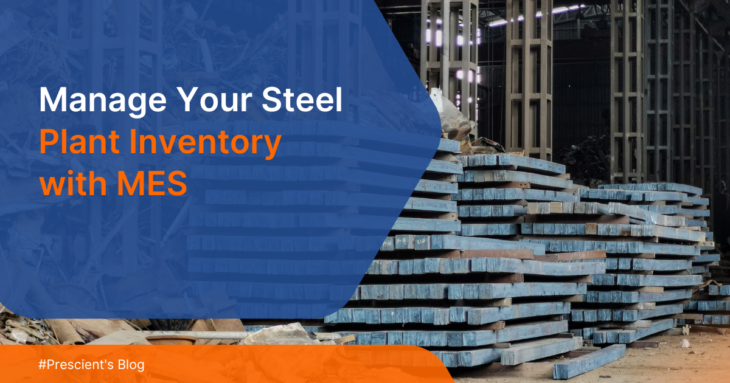How MES Improves Inventory Management in Steel Plants
The production of steel requires raw materials such as iron ore, coke, chemicals, scrap steel, fuels, and many other things that are made into the final product. All of these materials, including unfinished items, moving from one stage to the other, makeup inventory. Given the fact that inventory comprises raw materials, WIP, and finished products, the management of the inventory process is quite challenging. The key consequences of ineffective inventory management are elevated product costs, squandered resources, and time consumption. Having an option of tracking inventory in the production cycles through the Manufacturing Execution System (MES) can provide unique benefits to inventory management. In this blog, we focus on the MES inventory management in steel plants, as well as the advantages it has. How Inventory Management Works in a Steel Plant In a steel factory, inventory flows throughout the plant as the products are being made. Inventory can be classified into three main categories: Handling inventory in a steel plant involves moving materials from one place to another and storing them in buffer zones for each process. It should be noted that it moving and storing inventory throughout the plant involves costs and takes up space. Transporting raw materials and WIP items requires heavy-duty equipment, and maintaining large storage facilities also adds to expenses. If inventory builds up because of disruptions in the plant, it can lead to further disruption of the flow. For instance, too much WIP inventory can clog up production lines, create bottlenecks, and slow down the entire operation. This not only causes delays but also leads to increased operational costs. On the other hand, inadequate inventory can result in stockouts and halt production altogether. It’s a delicate balance to maintain enough inventory to keep things running without overloading the system. Efficient inventory management from the top down is key to minimizing delays and additional costs. Traditionally, it is a major task to keep a close watch on inventory levels and requires the cooperation of all departments to keep production going smoothly. How MES Improves Inventory Management MES inventory management in steel industry brings with it a suite of capabilities from real-time observation to ERP integration that can optimize the inventory management process. Here is now: 1. MES Integrates With ERP Systems MES is designed to integrate with Enterprise Resource Planning (ERP) systems to open up benefits that extend beyond what the individual systems can give. The integration links the production floor with business processes so it can help streamline inventory management and align production in accordance with all the other factors. Data analytics that comes from ERP systems become more powerful and provide insights into manufacturing, logistics, and supply chain efficiency. The biggest benefit is that the integration ensures that all departments, from procurement to production and sales, all work off the same data. 2. Real-Time Inventory Tracking MES inventory management in steel plants provides real-time tracking by using integrated sensors in the form of IIoT data collection across the production line. These sensors monitor inventory movement throughout the factory. They keep track of data from raw materials entering the plant to WIP material and the finished goods leaving for distribution. The system is highly beneficial for plans that use the ABC analysis for stock control. MES can maintain a vigilant eye on the category A items and ensure all are accounted for and wastage is reduced. Data is updated continuously in the system, allowing plant managers to see inventory status at a glance. This real-time tracking also helps prevent errors like overstocking or shortages by providing a quick view of inventory levels. Real-time inventory tracking is also crucial for plants utilizing the Just-In-Time of inventory management. MES tracking inventory at each station can automatically issue Kanban cards to bring in more material as the inventory gets depleted. Going further, by using the data available on inventory movement, operators can make decisions regarding production, halt to tackle challenges or divert workflow to avoid bottlenecks. 3. Automated Reordering and Stock Optimization When MES systems work together with ERP systems, they bring a higher level of smart decision-making to inventory management. The integration can be set to automate the reordering of raw materials based on real-time data and market trends. For instance, the steel market has been volatile for the last decade because of policy changes, supply chain constraints, and geopolitics. McKinsey even recommends that steel producers need to double down on technological agility to handle the volatility of the markets. If a spike in steel demand is expected, the system can be used to readjust order levels to keep up. With this capability, production can keep running smoothly without interruptions. 4. Reducing Waste and Improving Cost Efficiency MES inventory management in steel plants helps reduce waste and improve cost efficiency by tracking excess inventory and spotting waste reduction opportunities. It analyzes inventory levels and production data to reveal where surplus stock is piling up or where processes are inefficient. For example, if MES identifies an overstock of certain scrap-grade steel, it can prompt adjustments in raw materials to avoid unnecessary storage costs. The instant data-backed approach means that less money is wasted on unused inventory and storage. Basically, MES optimizes inventory management, which helps steel plants cut waste and manage costs more effectively. To Wrap It Up Efficient inventory management is crucial for optimizing operations in steel plants. MES systems provide highly useful tools and ERP integrations for complete visibility and precise control over inventory. As steel plants navigate the tough times of modern production, incorporating MES inventory management in steel production is the way forward to staying competitive. If you’ve been struggling with inventory management, then FactoryCONNECT is just the MES solution you need. To learn where you are losing time, money, and resources, get in touch with our team and ask for a demo today!
Read More